Written, translated, compiled, and adapted by:
The Flying Granny
Unless otherwise stated
Photographs source: Wikimedia all are in the public domain
I thank the generous people who posted their work for us to use.
Original graphics design: rellijac
Photo Cover: Wikimedia, Photos are in the public domain
See full list below
Thanks to all the generous people who posted their work for us to use.
Pics source: Wikimedia
Unless otherwise stated
M USTARDS HIDDEN POWERS
 Mustard in its original form is a small, round, and inconspicuous grain. Its properties are often ignored. There are three different varieties of this herb - white, black, and Brown/Indian. For many years, these grains were used in the kitchen to spice up marinades, preserves, and salads. All of the varieties have a similar effect, and can also be used away from the kitchen.
Mustard in its original form is a small, round, and inconspicuous grain. Its properties are often ignored. There are three different varieties of this herb - white, black, and Brown/Indian. For many years, these grains were used in the kitchen to spice up marinades, preserves, and salads. All of the varieties have a similar effect, and can also be used away from the kitchen.
Mustard is rooted in folk medicine; it is mentioned in the New Testament and has prognostic and aphrodisiac properties.
White mustard comes from southern Europe. It has 4 petals of golden-yellow flowers from which the bees collect nectar to produce honey with a slightly bitter aftertaste. The grains are spherical, very fine, and light yellow in color.
White mustard is used to treat gastrointestinal tract disorders (indigestion, constipation), inflammation of the stomach and intestines, and also - according to folk medicine - in the treatment of rheumatic diseases, and Arthralgia (mustard packs).
Black mustard
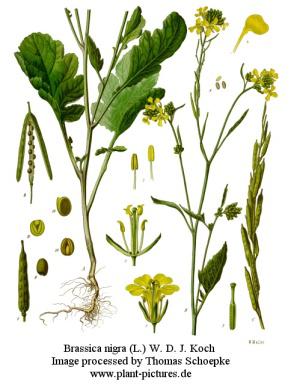 Black mustard originates in the northern reaches of Africa and South-Western Asia. It has small yellow flowers. Its Siliques, are black, small, and spherical, and have a length of about 2cm.
Black mustard originates in the northern reaches of Africa and South-Western Asia. It has small yellow flowers. Its Siliques, are black, small, and spherical, and have a length of about 2cm.
Black mustard has a slightly wider application range. It is known for its diuretic action and has laxative (constipation), anti-inflammatory (Gastroenteritis), and shielding (gastric and duodenal ulcers) properties. Infusions are often used as a rinse, for treating throat inflammations. Its bitter oil has similar properties to those of Bile, stimulating pancreatic secretion. This is useful for the treatment of rheumatic diseases, of colds (antibacterial), and of hypertension.
Brown / Indian mustard
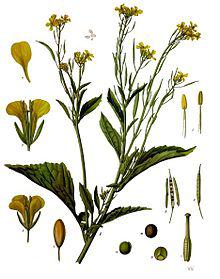 Brown mustard comes from India. It is distinguishable by the strong burning taste when crushed. Its flowers are pale yellow, and its seeds are rich in oil. This variety has similar properties as described above, and yields the grains for making of the ubiquitous sharp mustard.
Brown mustard comes from India. It is distinguishable by the strong burning taste when crushed. Its flowers are pale yellow, and its seeds are rich in oil. This variety has similar properties as described above, and yields the grains for making of the ubiquitous sharp mustard.
Mustard causes congestion in the region of the reproductive organs. The increased blood-flow causes extra sensitivity to stimuli. As such, it is an aphrodisiac, but not of the type recommended for pregnant women as it can induce labor.
Mustard How-Tos
Mustard Infusion:
1 tablespoon of white mustard seeds in a pot together with a glass of water. Cook over low heat for 5 minutes. Drink half a glass after a meal.
Poultice of mustard:
Pour boiling water over mustard seeds. Crush the seeds to a mash. Wrap in a cheese cloth and apply to the sore spot.
Mustard packs:
Use different sized cotton bags (depending on the patient's joint). Fill the grains to occupy capacity of the bag and sew the open end. Apply it to the aching joints.
A NISE Y OUR W INTER F RIEND
Anise has a specific, intense, almost pungent odor, which reminds us of the anise candy available at a time where candy was scarce. Today, with the abundance of sweets, anise takes a back seat; this is a shame because some of its unique characteristics could benefit you well, especially in winter.
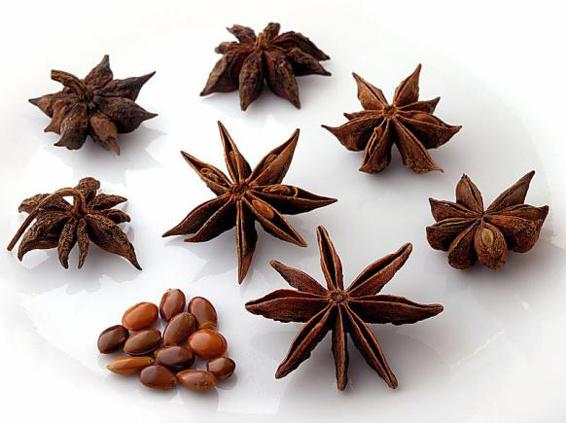
How Can Anise Help?
Anise combats the effects of overeating, especially in the winter months, and specifically Christmas meals and treats. Anise effectively combats problems with the gastrointestinal tract such as colic, flatulence, nausea, or indigestion.
Anise infusion:
Boil 6 teaspoons of anise in 4 cups of water, until quantity is reduced by half. Strain the liquid and add 3 tablespoons of honey. Take 2 teaspoons 3 times a day, when you are ill or down on energy.
This infusion is good against colds, persistent coughs, rhinitis, laryngitis, and bronchitis. It can also be used as an agent for clearing mucus in the throat, larynx, and trachea.
Anise has antibacterial properties, and is effective against constipation. It is particularly recommended for the relief of colds and the treatment of digestive problems in young children.
It is also known to stimulate the libido and has shown to have positive effects on sexual health.
Its strong odor makes it a perfect spice that lends great taste and aroma to cooked or baked dishes.
T REAT SKIN INFLAMMATION GRANNYS WAY
Inflammation of the skin may appear as an irritation, redness, swelling, and itching, creating bubbles, cracks, and even bleeding. This may be due to an allergic reaction to allergenic substances that enter the body through inhalation of dust, pollen, etc. Another way is by eating some types of food like milk, eggs, wheat, citrus fruit, and soy products.
Some people suffer from dermatitis occurring after contact with certain compounds, like nickel, latex, detergents, and disinfectants, which brings on a strong allergic reaction. Dermatitis may also be caused by the sun or induced by the use of antibiotics.
To relieve inflammation:
Avoid its causes. Try to be aware of cause and effect see what happens when
 Avoid stress and try to get a good night's sleep.
Avoid stress and try to get a good night's sleep.
Limit your sugar intake and change your diet to a healthy and balanced one, to include fruit and vegetables rich in Flavonoids (vitamin A, vitamin A, B, zinc, and vitamins C and E).
Smoking, and drinking coffee and alcohol will aggravate the situation; avoid them as much as you can.
Keep the air humid, and use lanolin- and olive oil-free body lotion.
Bathe in lukewarm water, adding 2 cups of starch or 2 tablespoons of baking soda. Avoid soap that dries the skin.
Wear gloves while doing your housework.
If you are allergic to dust stow away your carpets and rugs; vacuum and wash the floor as often as possible.
Launder your bedding in hot water.
The sun may improve your skin condition or cause damage; make sure before exposure to the sun.
If theres no adverse effect, add to your diet parsley and celery.
Wear cotton and breathable clothes - synthetics can make the situation worse.
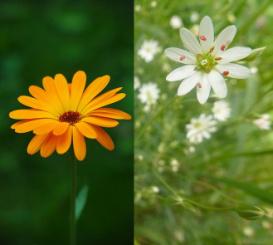
Calendula (marigold) and chickweed are anti-inflammatory, soothing dermatitis, and itching. To prepare calendula or chickweed wraps: pour a cup of boiling water over 1 tablespoon dried calendula flowers and leave for 15 minutes; or pour a cup of boiling water over 2 tablespoons chickweed and leave covered for 15 minutes. Apply to the affected areas.
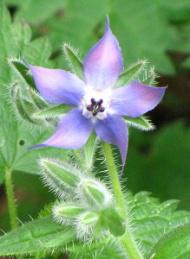
Next page
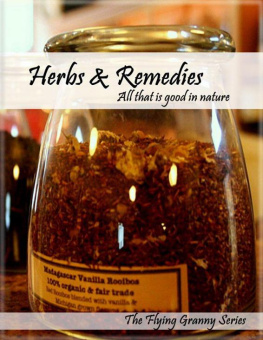

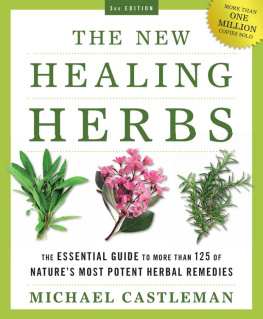

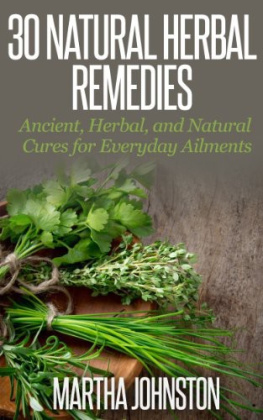
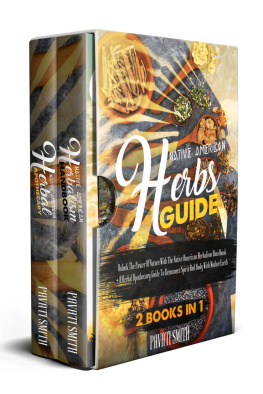


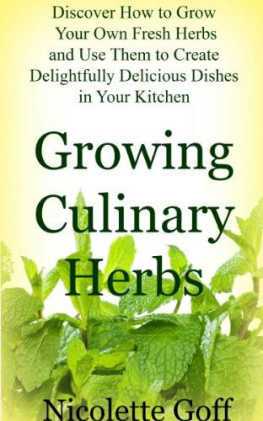
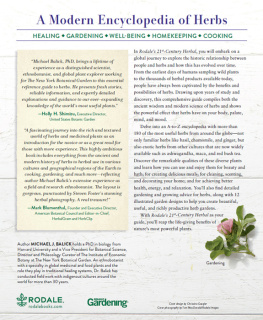
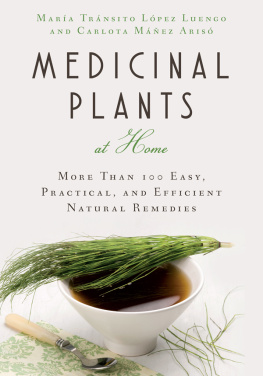
 Mustard in its original form is a small, round, and inconspicuous grain. Its properties are often ignored. There are three different varieties of this herb - white, black, and Brown/Indian. For many years, these grains were used in the kitchen to spice up marinades, preserves, and salads. All of the varieties have a similar effect, and can also be used away from the kitchen.
Mustard in its original form is a small, round, and inconspicuous grain. Its properties are often ignored. There are three different varieties of this herb - white, black, and Brown/Indian. For many years, these grains were used in the kitchen to spice up marinades, preserves, and salads. All of the varieties have a similar effect, and can also be used away from the kitchen. Black mustard originates in the northern reaches of Africa and South-Western Asia. It has small yellow flowers. Its Siliques, are black, small, and spherical, and have a length of about 2cm.
Black mustard originates in the northern reaches of Africa and South-Western Asia. It has small yellow flowers. Its Siliques, are black, small, and spherical, and have a length of about 2cm. Brown mustard comes from India. It is distinguishable by the strong burning taste when crushed. Its flowers are pale yellow, and its seeds are rich in oil. This variety has similar properties as described above, and yields the grains for making of the ubiquitous sharp mustard.
Brown mustard comes from India. It is distinguishable by the strong burning taste when crushed. Its flowers are pale yellow, and its seeds are rich in oil. This variety has similar properties as described above, and yields the grains for making of the ubiquitous sharp mustard.
 Avoid stress and try to get a good night's sleep.
Avoid stress and try to get a good night's sleep.
